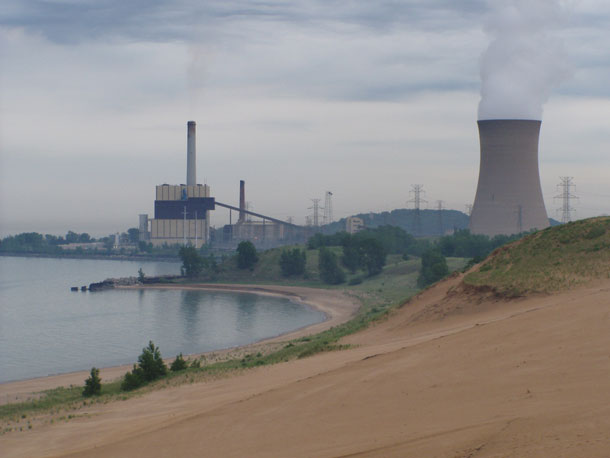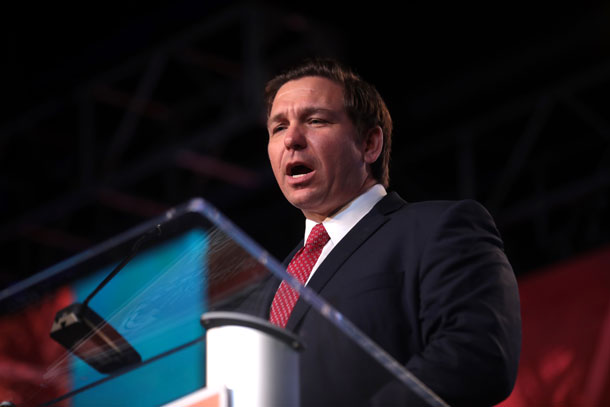Beyond the Headlines
Air Date: Week of January 18, 2019

The Northern Indiana Public Service Company plans to have all of its coal-fired power plants closed down in favor of renewable energy generators within 10 years. (Photo: Chris Light, Wikimedia Commons, CC BY-SA 4.0)
This week, Peter Dykstra and Living on Earth’s Bobby Bascomb take a trip beyond the headlines to investigate Northern Indiana Public Service Company's ambitious plan to go coal-free for electric generation within ten years. They also discuss Republican Governor Ron DeSantis’ signing of a bill to protect Florida’s waters. Then, the pair looks back at the 1994 publication of the Citizen's Right to Know list and what happened to it after 9/11.
Transcript
BASCOMB: It's time for a trip now beyond the headlines with Peter Dykstra. He's an editor with Environmental Health News. That's EHN.org and DailyClimate.org. Hey there, Peter, how you doing?
DYKSTRA: I'm doing all right, Bobby, hi. I'm going to start off with a groundbreaking announcement from an electric utility that has an ambitious goal to pull off something that seems almost unrealistic, but very promising, in a 10 year period. It's the Northern Indiana Public Service Company, and this delightful acronym of NIPSCO. And NIPSCO announced a commitment to convert from what they are now, which is predominantly coal-based electricity to coal-free electricity, and to do all that in 10 years.
BASCOMB: Wow, that is ambitious. How are they going to get there?
DYKSTRA: They want to leverage renewables, they want to completely end coal consumption, they'll still have some natural gas-generated electricity, and what that means is that they'll cut carbon emissions by 90% and a decade if they meet this ambitious goal.
BASCOMB: Of course, President Trump has famously said he was going to save the coal industry. But I've read recently that more coal-fired power plants have actually closed under Trump, then under Obama in their first term of office. I guess it doesn't bode too well for the coal industry.
DYKSTRA: Yeah, it's a further sign that the domestic market for coal is disappearing. That doesn't always apply to the international market. But going back to NIPSCO, there's a little bit of a catch. They've applied to the state of Indiana for a 12% rate increase. That’s about 100 bucks a year for the average ratepayer. That's what they say they are going to need to pull this off, but let's see if they can deliver on this really ambitious target.
BASCOMB: Um, what else do you have for us this week?
DYKSTRA: Here's something that may be positive news. The new Governor of Florida is a Republican named Ron DeSantis. You may remember he won a very, very tight race for Governor back in November. When he was a congressman, Ron DeSantis racked up a 3% lifetime score from the League of Conservation Voters, so any expectations that Floridians had for environmental goals were really, really low. But here's what he did in his first week in office. He signed an executive order that steered $2.5 billion toward protecting Florida's water resources, mainly the Everglades.

Republican Florida Governor Ron DeSantis recently signed an executive order that gives $2.5 billion to protect the Everglades. (Photo: Gage Skidmore, Flickr, CC BY-SA 2.0)
BASCOMB: Wow. Well, that's a great first step. I mean, doesn't exactly make him a tree hugger, but his predecessor Governor Rick Scott actually banned any discussion of climate change under his administration. So, I guess, baby steps?
DYKSTRA: He did. And Rick Scott is no longer Governor because he's now Senator Rick Scott. So he's got a whole new platform from which to talk climate denial.
BASCOMB: Right, right. Well, what do you have for us from the history vaults this week?
DYKSTRA: Here's a 25th anniversary. January 18, 1994, the EPA published something called the Citizen’s Right-to-Know list. There had been years of pressure not just from advocacy groups, neighbors of industrial facilities, fire departments, and other public safety people who wanted to know exactly what hazardous materials facilities were storing, or using, or emitting in their neighborhood. But then a few years later, along came 9/11, and there was a big push from industry to make all that information secret again. Their argument, or their fear was the chemical information could fall into the hands of terrorists. They didn't want it to fall into the wrong hands. But now such information has a much harder time falling into the right hands.
BASCOMB: Right, yeah, seems like first responders, at the very least, should know what they're up against when they get called to a situation. Well, thanks for those updates, Peter. Peter Dykstra is an editor with Environmental Health News, that’s EHN.org, and DailyClimate.org. We’ll talk you again real soon, Peter.
DYKSTRA: Okay, Bobby, thanks a lot. We'll talk to you soon.
BASCOMB: There’s more on these stories at our website, LOE.org.
Links
North American Windpower | “Indiana’s NIPSCO Plots Coal Phaseout, Transition To Renewables”
Living on Earth wants to hear from you!
Living on Earth
62 Calef Highway, Suite 212
Lee, NH 03861
Telephone: 617-287-4121
E-mail: comments@loe.org
Newsletter [Click here]
Donate to Living on Earth!
Living on Earth is an independent media program and relies entirely on contributions from listeners and institutions supporting public service. Please donate now to preserve an independent environmental voice.
NewsletterLiving on Earth offers a weekly delivery of the show's rundown to your mailbox. Sign up for our newsletter today!
 Sailors For The Sea: Be the change you want to sea.
Sailors For The Sea: Be the change you want to sea.
 The Grantham Foundation for the Protection of the Environment: Committed to protecting and improving the health of the global environment.
The Grantham Foundation for the Protection of the Environment: Committed to protecting and improving the health of the global environment.
 Contribute to Living on Earth and receive, as our gift to you, an archival print of one of Mark Seth Lender's extraordinary wildlife photographs. Follow the link to see Mark's current collection of photographs.
Contribute to Living on Earth and receive, as our gift to you, an archival print of one of Mark Seth Lender's extraordinary wildlife photographs. Follow the link to see Mark's current collection of photographs.
 Buy a signed copy of Mark Seth Lender's book Smeagull the Seagull & support Living on Earth
Buy a signed copy of Mark Seth Lender's book Smeagull the Seagull & support Living on Earth

